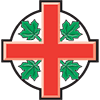In the normal course, an ordinary motion must be passed by a majority of the members of General Synod present and voting together.
Six members of General Synod may, prior to the question being put, require a vote by Orders, with a majority of each Order being necessary to pass.
If a question passes on a Vote by Orders, any six members (two from each of three different dioceses) may immediately before the next item of business require a vote to be taken by dioceses. A motion passes if a majority (or a tie) of dioceses vote in favour.
Source: Sections 4 and 5 of the Declaration of Principles and sections 18, 19 and 20 of the Rules of Order and Procedure.


